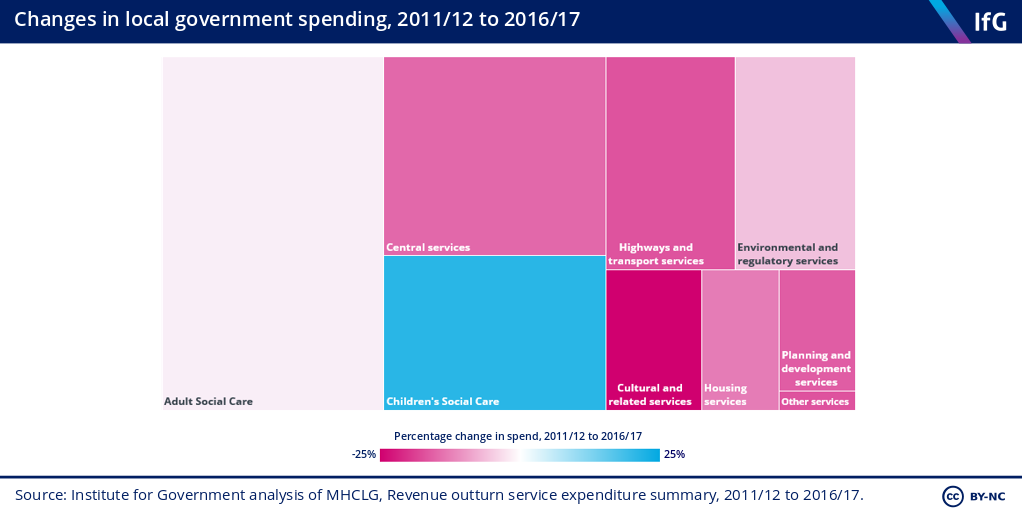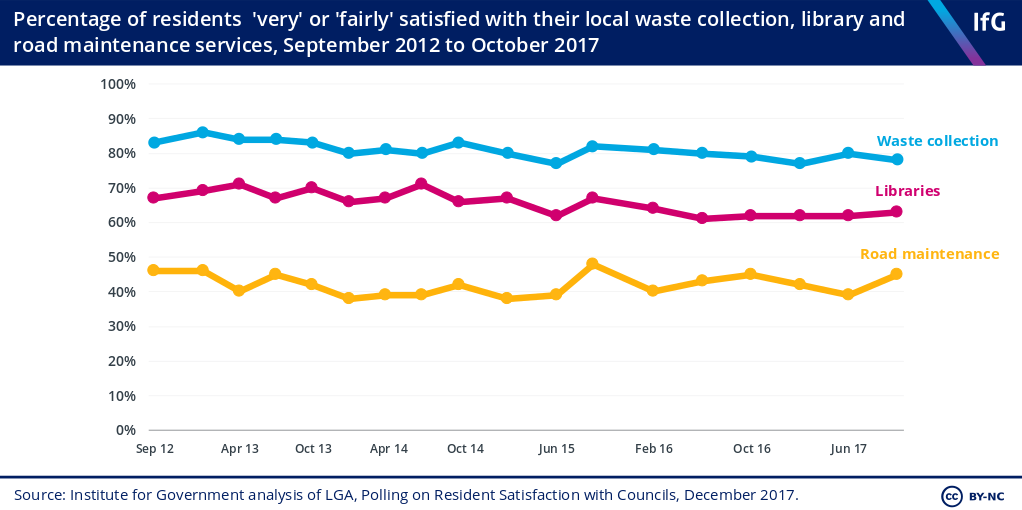
1. Remember your council will have less money to spend
The amount of money councils have to spend has fallen by almost 30% since 2010/11.
Spending is set to fall further this year and next. There is uncertainty about what will happen after that.
But given other demands on the public purse – not least from the NHS – fiscal constraint in local government is likely to continue.
Consequently, councils have cut spending on all local services apart from children’s social care over the same time.
Adult social care has also been relatively protected – spending was cut less deeply than other services between 2010/11 and 2014/15, and has increased since then.

Councils have prioritised spending on statutory services that they are obliged to provide and on visible services that voters notice most, like A-road maintenance.
But this has been done at the expense of other important but easier-to-squeeze services like Sure Start Children’s Centres, planning, and youth justice.
2. You’ll need to work out whether your council has made efficiencies or cut spending
Cutting spending does not have to mean cutting services.
Councils may have maintained the scope and quality of services, if they were able to find efficiencies.
There is some evidence of this. For example, resident satisfaction with libraries fell by just 4 percentage points between 2012 and 2017, whilst spending was cut 30%.

But there are now signs that spending cuts may have resulted in service cuts.
Of libraries opened since 2010, an increasing proportion are not managed directly by councils directly but are commissioned, or run by the community – entailing less council support. 57% of new libraries opened in 2016 were run by councils; compared to 88% in 2010.
Central government lacks data on service performance, but your council is likely to hold richer, more informative, data.
You need to use this data to judge the local results of spending cuts, and what the implications of further spending cuts in different areas would be.
3. You’ll have to be upfront about prioritising…
In order to manage with tighter budgets, councils have prioritised. That’s particularly true where councils are responsible for social care.
Those authorities have largely protected social care spending, while heavily cutting spending on ‘neighbourhood services’.
Our Performance Tracker analysis (produced in partnership with CIPFA) suggests that the impact on those services – while not insignificant – has not mirrored the scale of the spending cuts. Councils have found new ways of doing things, and squeezed efficiencies out of the private and voluntary organisations that are contracted to provide many of their services.
But your room for manoeuvre is not infinite. The Office for Budget Responsibility – the official fiscal watchdog – estimates that only 28% of council spending is now genuinely ‘flexible’, free from demand-led statutory obligations. And there are service pressures building up which suggest that – particularly in social care – efficiencies may not have much further to go.
Tough choices lie ahead, and it is important that you – and other local political figures – are honest about that.
4. …or ask residents to pay more for local services
In the face of rising demand and limited flexibility, you might want your council to spend more. As central government has reduced grant funding to councils (and intends to continue), more spending will mean raising the money locally, either through higher council tax bills or increased charges.
In this context, it is not surprising that the amount councils charge for services – such as collecting garden waste, parking, and burial and cremation – has increased.
Across non-social care services, council income from sales, fees and charges rose 5.8% over the last six years. 95% of councils reportedly plan to increase their council tax this year – although there is a limit to how high they can push it without having a referendum.
5. You’ll need to learn from your neighbours
No council is an island. Specific challenges vary but all councils face a common challenge – delivering vital services with smaller budgets.
Failing to look at what belt-tightening or transformation projects have been tried before, or elsewhere, is costly, time-intensive and risks duplicating reforms undertaken in other parts of the country.
Previous Institute for Government research has shown that councils benefit most from sector- and peer-led learning. You should encourage your officials to learn from other councils – and talk to your political counterparts in other boroughs.
Innovation is already happening locally: you can show Whitehall how it’s done.




















